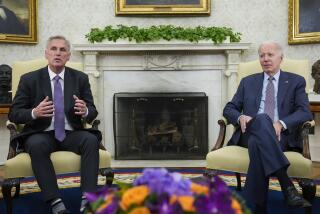Despite Debate, Undecided Vote Is Still Up for Grabs : NAFTA: Critical test will come this weekend. Lawmakers will be visiting their districts to assess constituents’ reaction.
- Share via
WASHINGTON — While pundits dissected the results of Tuesday’s debate, the matchup between Vice President Al Gore and billionaire Ross Perot had no visible effect Wednesday on the most important viewers--the lawmakers who still are agonizing over how to vote on the North American Free Trade Agreement.
“It was good theater,” said Rep. Henry A. Waxman (D-Los Angeles), one of the undecided.
Added another, Rep. Nita M. Lowey (D-N.Y.): “I predicted it would be a circus and I was right.”
Polls and telephone calls to lawmakers’ offices seemed to indicate that the public had responded favorably to Gore’s performance.
But while supporters were heartened, even they acknowledged that it may not have much bearing on the outcome. The real test, they said, will come this weekend, when House members return to their districts and take a final reading from their constituents before Wednesday’s vote.
“I don’t think it changed any votes here but when members go home this weekend, hopefully they will see a different dynamic occurring,” said Rep. Robert T. Matsui (D-Sacramento), who is helping lead the effort to win approval of the trade pact.
But he conceded that his side has been far less effective than opponents--primarily organized labor and Perot’s United We Stand, America organization--in making wavering members feel the heat.
“We haven’t had the same kind of organized strength from the business community,” Matsui said.
AFL-CIO Secretary-Treasurer Thomas R. Donahue said that House members who are still undecided will again be “hearing from the people in their respective districts.”
“Labor’s always been a friend of mine and a supporter so I’m looking very carefully at what they are saying,” said Rep. Lucille Roybal-Allard (D-Los Angeles), who has yet to commit her vote.
No one can be certain how many minds remain to be made up. Rep. David E. Bonior of Michigan, the third-ranking House Democrat and the most vociferous opponent of the pact, said that his side has “over the number we need, and we feel comfortable with that.”
However, supporters were openly skeptical of Bonior’s count. While they admitted that they are still as many as 25 or 30 votes short of what they need, they insisted that the fight can be won.
“I think we can have the votes by the time the vote occurs to adopt NAFTA,” said House Speaker Thomas S. Foley (D-Wash.).
One problem for the vote-counters is the fact that those who claim to be uncommitted aren’t always telling the truth.
Others are holding out for deals from the Administration, and at least some are waiting until the last minute in hopes that they can be more certain which way the ultimate vote will go. That way, they can avoid casting an unpopular vote, if the effort is futile anyway.
With the House Democratic leadership badly split on the issue, the President and his forces are seeking support in what for them is uncharted territory: the Republican side of the aisle.
On virtually every other vote this year, the House’s Republican minority has been largely ignored by the Democratic leadership and the White House. But this time their support is crucial to Clinton’s effort and the uncommitted among their numbers are being subjected to nonstop courtship by top Administration officials.
“It is kind of a reverse,” chuckled Rep. Hamilton Fish Jr. (R-N.Y.). “We’ve gone from being criticized for opposing what we considered to be ill-advised economic policy to being relied on to define the nation’s economic prospects for the next several years or decades. . . . Proponents from the Administration paint such a dire picture if NAFTA fails, it makes me wonder why such responsible people in the House--in the leadership of the House--disagree.”
Times staff writer Michael Ross contributed to this story.
More to Read
Get the L.A. Times Politics newsletter
Deeply reported insights into legislation, politics and policy from Sacramento, Washington and beyond. In your inbox twice per week.
You may occasionally receive promotional content from the Los Angeles Times.










